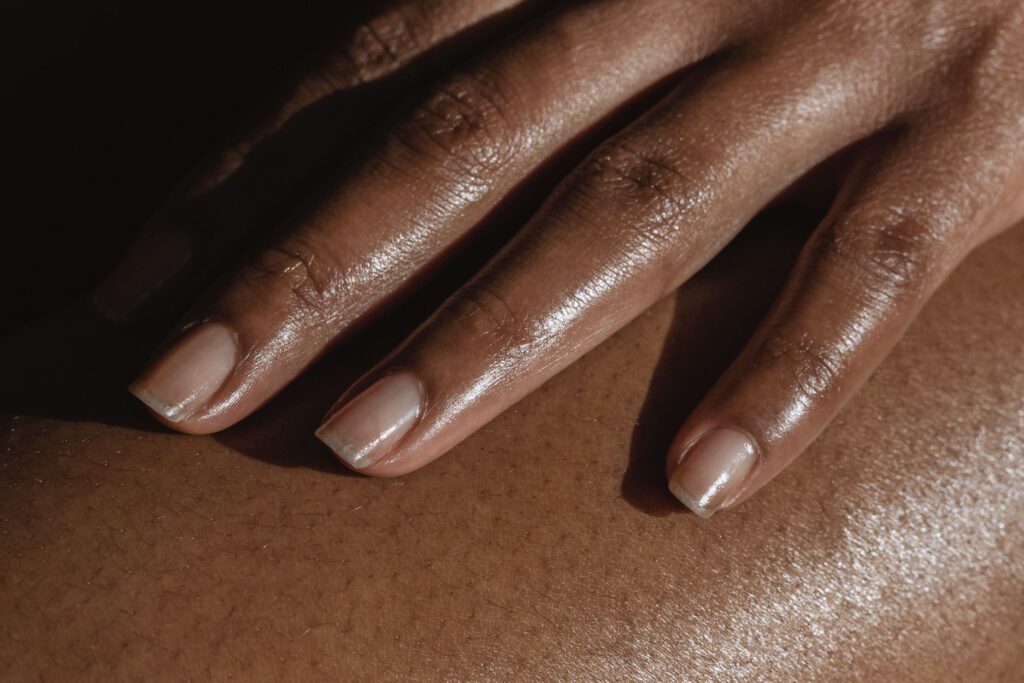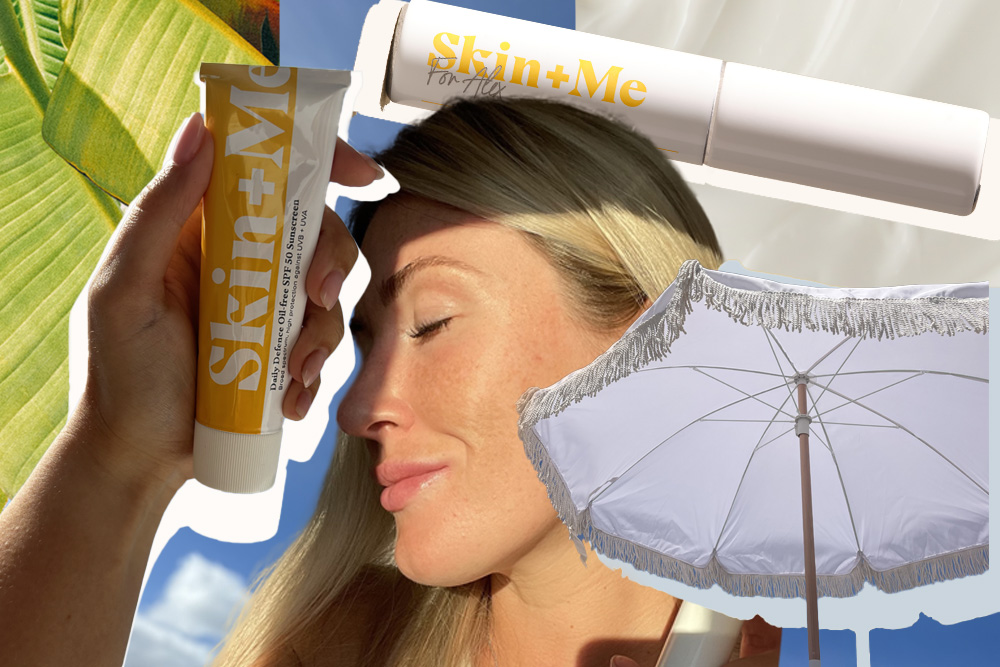Melasma 101

Link to share article here:
Skincare 101: Everything You Need To Know About Dry Skin
If you live with dry skin, you’ll be familiar with irritation, flakiness and the uncomfortably tight feeling you can get after cleansing. You’re also likely to get through tonnes of moisturiser. Products that protect and replenish are your holy grail.
At Skin + Me we get lots of questions from people with dry skin who find it difficult to manage the condition – and associated skin concerns such as psoriasis, eczema and dermatitis. Here we take a look at the causes, symptoms and treatments available to give dry skin the TCL it deserves.
Dry skin vs. dehydrated skin
It can be useful to identify whether your skin condition is dry – lacking oil (or sebum) or dehydrated – lacking in water, before you think about how to treat it.
Dehydrated skin can be dull, low in elasticity and sensitive. The key here is to drink water, consume more water-rich foods and use moisturising products to prevent more water loss from the skin barrier such as ones containing ceramides and glycerin.
Dry skin, with that tell-tale flaky, scaly and irritated appearance is a skin type. Water isn’t the main issue here. The skin lacks oils and needs hydrating products and then another step to seal that moisture in – think hyaluronic acid, followed by ceramides.
Dry skin FAQs
We ask our Consultant Dermatologist, Dr Malvina Cunningham and Head of Medical, Dr Jason Thomson more about causes, symptoms and treatments for dry skin.
Why does dry skin get worse in the winter?
Dr Malvina Cunningham: Falling temperatures and low humidity have a negative effect on our skin barrier meaning it becomes weaker and it is more susceptible to environmental stressors and allergens. A compromised skin barrier drives inflammation leading to redness, dryness and irritation.
There’s lots of searches for ‘dry skin under eyes’ online – why does this area dry out in particular? What can you do to solve it?
Dr Malvina Cunningham: The eye area is particularly sensitive as the skin is more delicate and generally thinner. Taking care of the eye area using effective skincare is more important than we think. That said, you don’t need eye-specific skincare per se.
Dry skin products, moisturisers and key ingredients
Which ingredients should you be looking out for if you have dry skin? And which should you avoid?
Dr Malvina Cunningham: Moisturisers containing barrier-friendly ingredients such as glycerin, shea butter, niacinamide and ceramides or urea are great at repairing our barrier and protecting it.
Extra moisture can be achieved with the hydrating ingredient hyaluronic acid which can be found in many great hydrating serums that can be layered underneath your moisturiser.
Try to avoid harsh cleansers such as gel and foaming cleansers in the winter and reduce the frequency or even stop the application of strong exfoliators such as AHA and BHAs.
What’s the best morning and evening skincare routine for someone with dry skin?
This does depend a bit on the cause of dry skin but everyone benefits from a twice-daily regime that starts with cleansing your skin using a gentle cream cleanser that leaves your skin hydrated. In the morning, follow with a moisturiser and sunscreen (SPF 30+) and in the evening, use a hydrating serum under your nighttime moisturiser. I also suggest adding treatment creams containing active ingredients that focus on targeting specific skin goals.
If you have dry patches on your nose and face, but otherwise your skin is normal, how should you treat those specifically?
Dr Malvina Cunningham: Again, this depends a bit on the cause of the dry patches but using a richer moisturiser or repair cream directly to the patches twice daily can often help. Choose moisturisers containing niacinamide or urea in particular. If the patches persist and feel itchy, a review by a medical professional is a good idea.
Are there any changes you can make in terms of diet and lifestyle that can help with dry skin?
Dr Malvina Cunningham: Keeping well hydrated and getting enough sleep are key. Alcohol dries the skin out significantly so if your skin is going through a dry patch, focus on the basics as well as your skincare. I also find a humidifier at home really useful particularly if you like the heating on a lot like me!
If your skin needs a moisture boost, can you use hyaluronic acid whilst using Skin + Me treatment?
Dr Malvina Cunningham: Hyaluronic acid is one of my favourite hydrating ingredients. It’s essentially a molecule that keeps water in your skin. It’s nice to use in combination with the tretinoin and azelaic acid (you may find in your Daily Doser) as it helps skin to replenish after the drying effects of ingredients. You can absolutely combine them.
The best moisturising ingredients for dry skin conditions
Is it true that dry skin always needs more moisturiser and what are the best moisturising ingredients?
Dr Jason Thomson: It’s generally true that dry skin needs more moisturiser. Dry skin lacks hydration often because the skin barrier (the outer layer of the skin) is not doing its job of keeping moisture in or it’s not producing enough oil and this results in dull, flaky, tight, sometimes itchy and inflamed skin.
Regardless of the underlying cause of the dryness, adding hydration with a regular moisturiser should be an essential part of your skincare routine if you have dry skin.
There’s a huge variety of moisturisers out there but they’ll normally contain three main moisturising ingredients: humectants, emollients and occlusives.
What’s best for your dry skin will often depend on any other skin conditions you have (for example, if you’re prone to acne you’ll want to make sure your moisturiser is non-comedogenic) as well as factors like the time of year (lighter in summer months, richer in colder months).
Using retinol on dry skin and exfoliation
What’s the best way to incorporate active ingredients like retinol and retinoids into your skincare routine without further irritating dry skin?
Dr Jason Thomson: Dry skin can be easily irritated so it’s also important to avoid harsh skincare ingredients (start on the lowest strengths if using active ingredients such as retinol and gradually increase) and always use a gentle, hydrating cleanser.
Should you exfoliate dry skin?
Dr Jason Thomson: Some advocate exfoliating dry skin but this should be done with caution and should be avoided if you have inflamed, irritated, dry skin such as with eczema. If you have mild flaky, dry skin, you may benefit from a gentle, hydrating PHA (polyhydroxy acid) exfoliant cleanser alongside your regular moisturiser.
Dry skin, psoriasis symptoms and treatment
Psoriasis is a long-term skin disease associated with dry skin. It can cause red, itchy, scaly patches of skin on the body and face. Psoriasis tends to flare up in cycles before it goes into remission.
Can you tell us more about psoriasis as a condition, its symptoms and how it can be treated?
Dr Jason Thomson: There’s no cure for psoriasis but there are various treatments that can improve the symptoms and appearance of the condition. The options for treatment will depend on the type of psoriasis, how much of the body is affected and whether or not other parts of the body are affected such as the joints.
General skin care measures are usually the first starting point in treating psoriasis, regardless of severity and include regularly moisturising the skin with creams or ointments. These can be prescribed by a doctor or bought in pharmacies or beauty shops and they work by reducing dryness, scaling, cracking, itching and generally make the skin more comfortable. It’s also advised to avoid soaps and shower gels and instead use ‘soap substitutes’, products such as Dermol 500 lotion or emollients.
Mild cases of psoriasis usually respond well to topical treatments (creams, ointments, gels applied to the skin) which deliver various medicines such as steroids, vitamin D analogues and coal tar. Phototherapy is a very effective treatment that involves giving controlled doses of ultraviolet light within a specialised dermatology unit usually two to three times a week for several weeks. This is not the same as using a sunbed (these are dangerous, can cause deadly skin cancers and should be avoided by everyone).
For moderate to severe psoriasis, there’s a range of treatments including tablet treatments and newer injection treatments that generally work to modify the immune system and reduce inflammation. While most people with mild psoriasis will be managed by their GP, those with more severe psoriasis needing tablet or injection treatment will usually be referred to a dermatologist.
People with psoriasis have a slightly higher chance of suffering with other medical problems such as heart attacks, strokes, type two diabetes and high blood pressure. This means addressing lifestyle factors is also an important part of managing the health of people with psoriasis and means stopping smoking, reducing alcohol intake, maintaining a healthy weight and having a balanced diet.
We know that psoriasis of any severity can have a big emotional impact including low self-esteem and mental health issues such as anxiety and depression, so it’s important for healthcare professionals to assess the psychological impact of psoriasis alongside the physical symptoms of the condition. In addition to getting help from a healthcare professional, patient support groups and psoriasis charities can be a valuable source of information and help (papaa.org and psoriasis-association.org.uk).
Medical facts checked by Consultant Dermatologist, Dr Malvina Cunningham.
New to Skin + Me? Get your first month of personalised skincare for £4.99 with promo code DOSE – complete our quick consultation here.
Looking for a routine refresh? Add the Dream Routine to your Skin + Me subscription.
In need of a restock? Head to The Skincare Shop for one-off purchases of your Routine Essentials.



